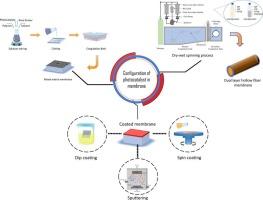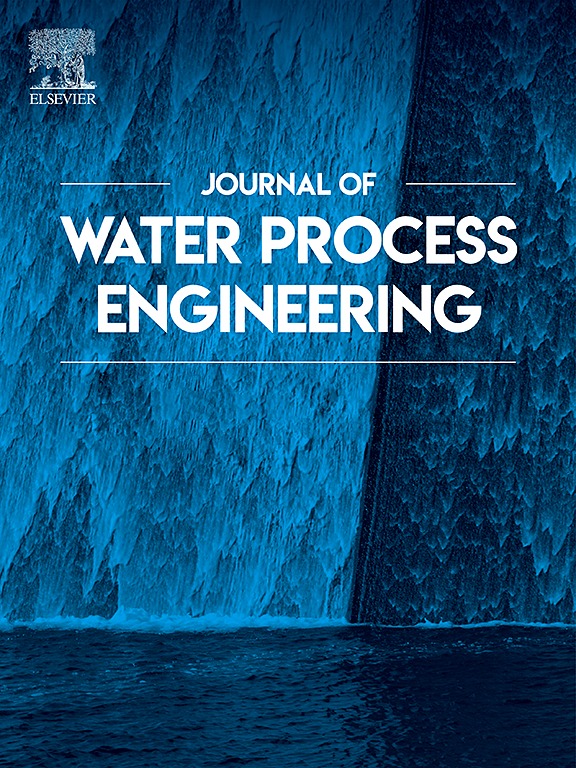Advancing photocatalytic membrane for efficient endocrine disrupting compounds removal: Progresses and challenges
IF 6.3
2区 工程技术
Q1 ENGINEERING, CHEMICAL
引用次数: 0
Abstract
In recent decades, the booming industrial sectors have introduced multiple pollutants into water bodies, including endocrine-disrupting chemicals (EDCs). These pollutants pose serious human and animal health risks, particularly affecting the reproductive, neurological, and immunological systems, even at extremely low concentrations in aquatic environments. The development of photocatalytic membrane technology has captivated tremendous interest from researchers, prompting further investigation into its application for abating hazardous EDCs in water. A detailed assessment of the various techniques for developing photocatalytic membranes targeting to remove EDCs from water bodies is provided in this review. The recent progress related to membrane fabrications, modifications, characterizations, and performances are discussed. The challenges that arose in the process of utilizing photocatalytic membrane technology were highlighted along with recommendations for future developments. Technical applicability is considered a vital factor in determining the best photocatalyst immobilization technique for treating water and facilitating the wide adoption of the technology in real settings. By comprehensively reviewing the techniques, their features and performances, it is anticipated that the range of techniques reviewed offers promising avenues that pave the research in this area.

推进光催化膜高效去除内分泌干扰化合物:进展与挑战
近几十年来,蓬勃发展的工业部门向水体中引入了多种污染物,其中包括干扰内分泌的化学品(EDCs)。这些污染物严重危害人类和动物的健康,特别是影响生殖、神经和免疫系统,即使在水生环境中浓度极低。光催化膜技术的发展引起了研究人员的极大兴趣,促使他们进一步研究其在减少水中有害 EDCs 方面的应用。本综述详细评估了开发用于去除水体中 EDCs 的光催化膜的各种技术。讨论了与膜的制造、改性、表征和性能有关的最新进展。强调了在利用光催化膜技术过程中出现的挑战,并对未来的发展提出了建议。技术适用性被认为是确定处理水的最佳光催化剂固定化技术以及促进该技术在实际环境中广泛应用的重要因素。通过全面回顾这些技术及其特点和性能,预计所回顾的一系列技术将为这一领域的研究提供大有可为的途径。
本文章由计算机程序翻译,如有差异,请以英文原文为准。
求助全文
约1分钟内获得全文
求助全文
来源期刊

Journal of water process engineering
Biochemistry, Genetics and Molecular Biology-Biotechnology
CiteScore
10.70
自引率
8.60%
发文量
846
审稿时长
24 days
期刊介绍:
The Journal of Water Process Engineering aims to publish refereed, high-quality research papers with significant novelty and impact in all areas of the engineering of water and wastewater processing . Papers on advanced and novel treatment processes and technologies are particularly welcome. The Journal considers papers in areas such as nanotechnology and biotechnology applications in water, novel oxidation and separation processes, membrane processes (except those for desalination) , catalytic processes for the removal of water contaminants, sustainable processes, water reuse and recycling, water use and wastewater minimization, integrated/hybrid technology, process modeling of water treatment and novel treatment processes. Submissions on the subject of adsorbents, including standard measurements of adsorption kinetics and equilibrium will only be considered if there is a genuine case for novelty and contribution, for example highly novel, sustainable adsorbents and their use: papers on activated carbon-type materials derived from natural matter, or surfactant-modified clays and related minerals, would not fulfil this criterion. The Journal particularly welcomes contributions involving environmentally, economically and socially sustainable technology for water treatment, including those which are energy-efficient, with minimal or no chemical consumption, and capable of water recycling and reuse that minimizes the direct disposal of wastewater to the aquatic environment. Papers that describe novel ideas for solving issues related to water quality and availability are also welcome, as are those that show the transfer of techniques from other disciplines. The Journal will consider papers dealing with processes for various water matrices including drinking water (except desalination), domestic, urban and industrial wastewaters, in addition to their residues. It is expected that the journal will be of particular relevance to chemical and process engineers working in the field. The Journal welcomes Full Text papers, Short Communications, State-of-the-Art Reviews and Letters to Editors and Case Studies
 求助内容:
求助内容: 应助结果提醒方式:
应助结果提醒方式:


